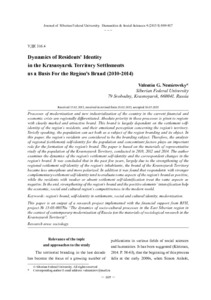Dynamics of Residents’ Identity in the Krasnoyarsk Territory Settlements as a Basis For the Region’s Brand (2010-2014)
Скачать файл:
URI (для ссылок/цитирований):
https://elib.sfu-kras.ru/handle/2311/16778Автор:
Nemirovsky, Valentin G.
Немировский, В.Г.
Дата:
2015-04Аннотация:
Processes of modernization and new industrialization of the country in the current financial and
economic crisis are regionally differentiated. Absolute priority in these processes is given to regions
with clearly marked and attractive brand. This brand is largely dependent on the settlement selfidentity
of the region’s residents, and their emotional perception concerning the region’s territory.
Strictly speaking, the population can act both as a subject of the region branding and its object. In
this paper, the region’s residents are considered to be the branding subject. Therefore, the analysis
of regional (settlement) self-identity for the population and concomitant factors plays an important
role for the formation of the region’s brand. The paper is based on the materials of representative
study of the population of the Krasnoyarsk Territory, conducted in 2010, 2012 and 2014. The author
examines the dynamics of the region’s settlement self-identity and the correspondent changes in the
region’s brand. It was concluded that in the past five years, largely due to the strengthening of the
regional settlement self-identity of the region’s inhabitants, the brand of the Krasnoyarsk Territory
became less amorphous and more polarized. In addition it was found that respondents with stronger
complementary settlement self-identity tend to evaluate some aspects of the region’s brand as positive,
while the residents with weaker or absent settlement self-identification treat the same aspects as
negative. In the end, strengthening of the region’s brand and the positive elements’ intensification help
the economic, social and cultural region’s competitiveness in the modern world Процессы модернизации и новой индустриализации страны в условиях современного
финансово-экономического кризиса носят регионально-дифференцированный характер.
Безусловный приоритет в этих процессах получают регионы с чётко выраженным,
привлекательным брендом. Данный бренд в значительной степени зависит от поселенческой
самоидентификации жителей региона, эмоционального восприятия ими своей территории.
Строго говоря, население может выступать и субъектом брендинга региона, и его объектом.
В данной статье жители региона рассматриваются как субъект брендинга территории.
Поэтому анализ региональной (поселенческой) самоидентификации населения и её факторов
играет важную роль для формирования бренда данного региона. В статье на материалах
представительных исследований населения Красноярского края, проведённых в 2010, 2012
и 2014 гг., прослеживается динамика поселенческой самоидентификации его жителей и
соответствующие изменения его бренда. Делается вывод, что за истекшие пять лет, во
многом за счёт усиления региональной поселенческой самоидентификации его жителей,
бренд Красноярского края стал менее аморфным и более поляризованным. Установлено,
что респонденты с сильной комплиментарной поселенческой самоидентификацией склонны
оценивать одни и те же черты регионального бренда как позитивные, со слабой или
отсутствующей поселенческой самоидентификацией – как негативные. В конечном итоге
укрепление регионального бренда и усиление в нём позитивных элементов способствуют
повышению экономической и социокультурной конкурентоспособности региона в
современных условиях
Коллекции:
Метаданные:
Показать полную информациюСвязанные материалы
Показаны похожие ресурсы по названию, автору или тематике.
-
Criteria of Mutual Understanding in Cross-Cultural Communication
German, Natalya Ph.; Н.Ф. Герман (Сибирский федеральный университет. Siberian Federal University, 2009-05)In this article the phenomenon of linguacultural identity of the subject of communication is considered as the main factor having an affect on the mutual understanding in the process of interaction. Linguacultural identity ... -
Religious Situation and Buryat Identity
Yelaeva, Irina E.; Елаева, И.Э. (Сибирский федеральный университет. Siberian Federal University., 2015-01)This article is devoted to the analysis of the relationship of the religiosity and Buryat identity; the historical context of the formation of the modern religious situation in Buryatia, which, in turn, has an impact on ... -
По следам человеческой идентичности
Петруцийова, Е.; Petrucijova, Jelena (Сибирский федеральный университет. Siberian Federal University., 2010-08)Статья посвящена анализу проблемы человеческой идентичности (индивидуальной и коллективной). Эссенциальный и экзистенциальный подходы рассматриваются в качестве традиционных подходов философии человека. В современной ... -
ETHNIC PECULIARITIES OF CULTURE AS A TOOL FOR BUILDING URBAN IDENTITY
Shlokina, A.A. (Siberian Federal University, Сибирский федеральный университет, Красноярск, Krasnoyarsk, 2019-05)Preservation of the ethno-cultural peculiarities of indigenous peoples is of particular importance in the self-identification of an individual. A high level of urban identity formation can be achieved by creating environmental ... -
RESPONSIBILITY OF THE UNION OF ARCHITECTS FOR SUSTAINING THE LOCAL VISUAL AND CULTURAL IDENTITY OF KRASNOYARSK AS A PROSPECTIVE CULTURAL CAPITAL OF EASTERN SIBERIA
Krzysztof, Nawratek; Belova, D.A. (Siberian Federal University, Сибирский федеральный университет, Красноярск, Krasnoyarsk, 2019-05)Krasnoyarsk has a rich and significant cultural and architectural history (since 1628), embodied in its architectural monuments and urban environment. After the fall of the Soviet Union with its well-defined visual and ...

